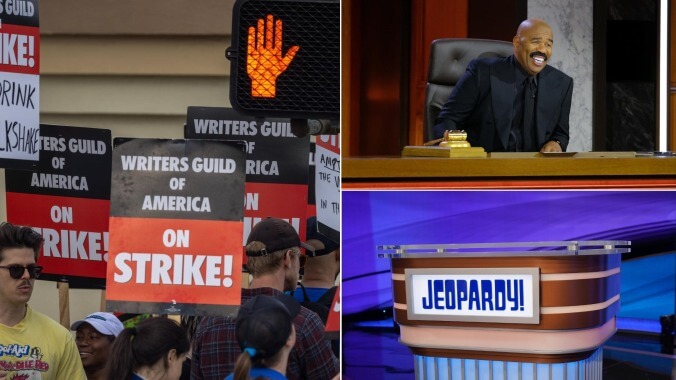WGA strikers (David McNew/Getty Images) , Judge Steve Harvey (ABC, Erika Doss), Jeopardy! (ABC, Christopher Willard) Image: The A.V. Club
This week, ABC announced a fall schedule that The Hollywood Reporter deemed “strike-proof,” referring to the idea that it won’t be impacted by the ongoing WGA strike. Every night of the week is entirely reruns or reality TV, including Dancing With The Stars’ return to the network after airing on Disney+, the premiere of The Golden Bachelor (can someone who is not 18–34 find love?!), and a night (Thursday) that’s all game show revivals. It’s like watching TV in the dead of summer, except it’s in the fall when the good TV shows are supposed to be on!
The implication from THR’s “strike-proof” note is that this is a good idea, or at least a smart move, especially in comparison to what CBS has announced for its fall schedule—which is completely packed with scripted shows even though there is currently nobody available to script them. CBS’ schedule is delusional, and if ABC’s schedule is wise by comparison, they both paint the picture of a bleak future (or at least near-future) for the world of television. (Fox, meanwhile, hasn’t announced a full schedule, but it is reportedly leaning hard on reality shows.)
Sticking with CBS for a moment, declining to even feign excitement about the reality TV possibilities of the fall schedule implies that whatever they do end up airing—THR floats the possibility of stretching summer’s Big Brother season into the fall, which is bad news for whoever gets locked in that house—will be afterthoughts. TV networks can’t have much faith in the intelligence of their viewers as it is, but surely it’s condescending to reality TV fans for CBS to say “here’s some slop for you to eat since we can’t make new episodes of FBI, FBI: International, FBI: Most Wanted, and FBI Hearts Abishola because we refuse to give the writers a fair deal.”
But ABC’s approach isn’t really any better, because it speaks to an eagerness to cut out writers and dive headfirst into a future where all TV is a game show or a reality show. The network has famously been casting The Golden Bachelor for years, with “Are you an older person looking for love?” messages airing on several seasons of the flagship show, so it has obviously been waiting for the perfect moment to pull the trigger on that. Similarly, in 2023, there’s no reason to be airing Judge Steve Harvey, Press Your Luck, and The $100,000 Pyramid in primetime. Eventually the people who care about those things will die, and network TV will die with them if the networks think that this is a viable way to both survive with the writers on strike and compete with the big streamers.
There’s also the matter of some specific shows on the ABC’s “strike-proof” schedule that may prompt uncomfortable questions. Celebrity Jeopardy! is prominently listed after being picked up for a second season earlier this week, but the first season of that show was hosted by Mayim Bialik, who bravely walked off regular Jeopardy! in solidarity with the striking writers (WGA members write the Jeopardy! questions/answers). Former fan favorite Ken Jennings pointedly did not do that and he’s still hosting Jeopardy! … pregnant pause… so ABC could have him host the celebrity variant of the show if the strike is still going on in the fall. But that would be bad (for him and for the network), as it would most likely require crossing a picket line.
Throw in the fact that there’s a growing movement among reality TV producers and editors to organize and have their work recognized as writing, since they’re crafting storylines just like anyone else who puts literal pen to literal paper, and it seems like reality TV isn’t the cheap and easy “strike-proof” parachute that the networks seems to be hoping it will be. It turns out that nobody likes making “disposable” content and being disrespected while they do it.
This “solution” is untenable. Even if reality TV fans come out in droves to support these all-unscripted schedules, the networks won’t be able to keep up this output. But if the networks don’t come up with real solutions that involve paying the people who make their shows what they deserve, then the future of TV is going to become even more bleak.


 Keep scrolling for more great stories from A.V. Club.
Keep scrolling for more great stories from A.V. Club.